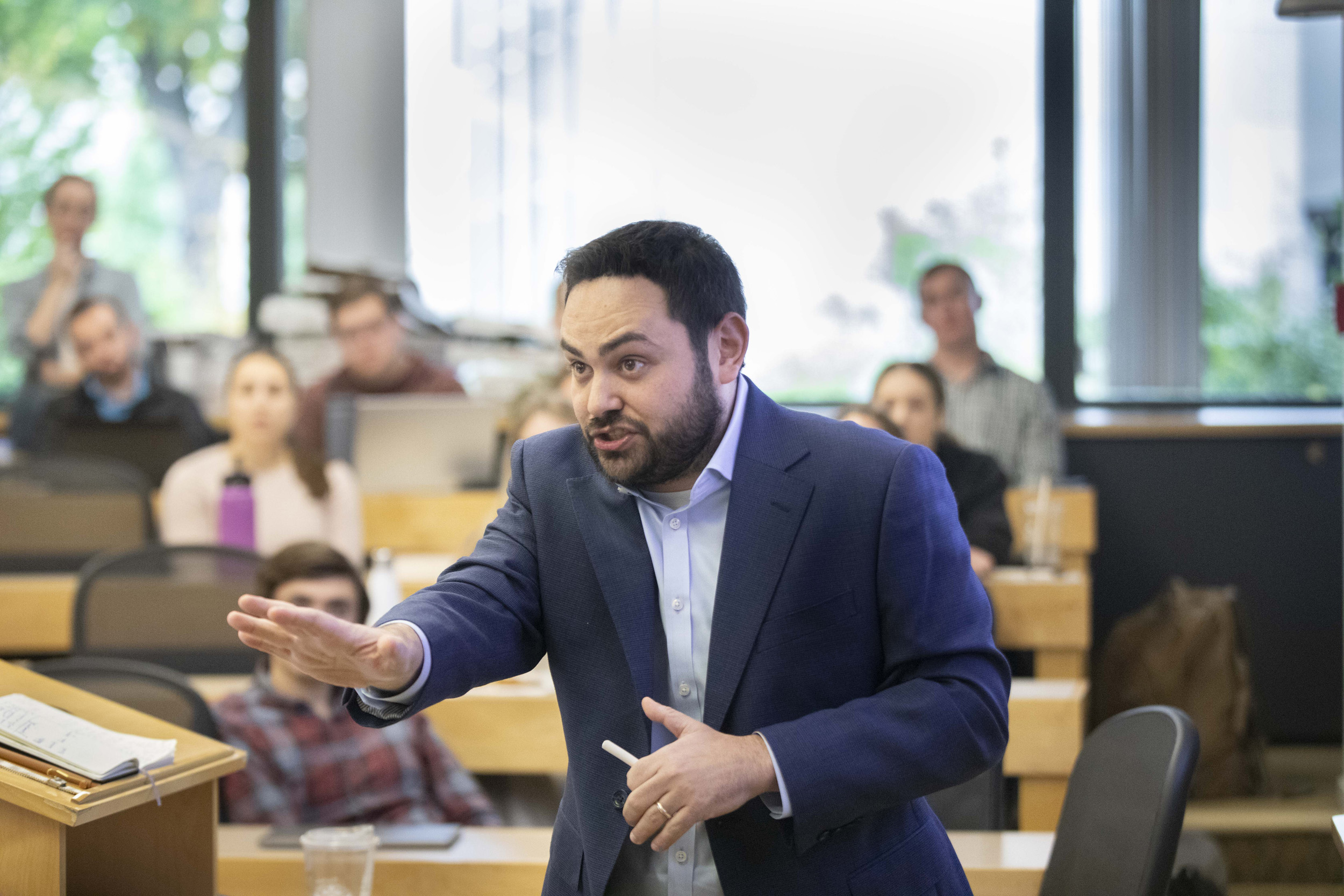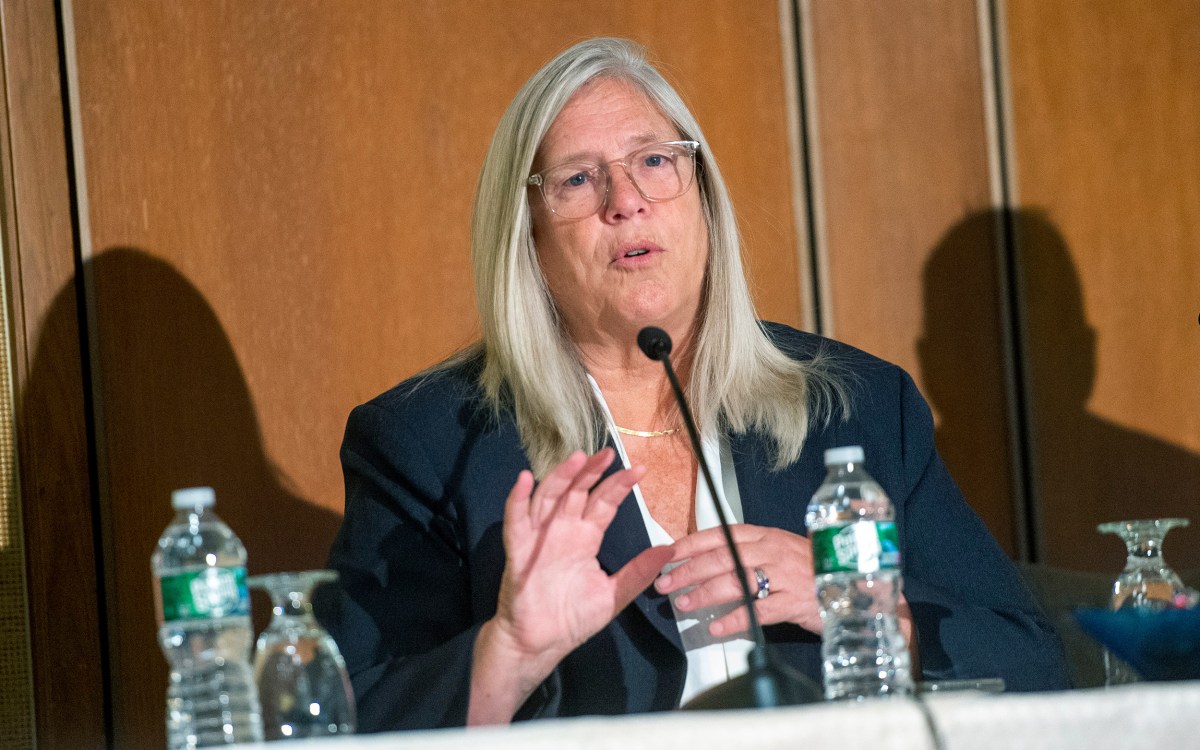
Asaf Lubin discusses his upcoming book “The International Law of Intelligence: The World of Spycraft and the Law of Nations.”
Kris Snibbe/Harvard Staff Photographer
Even war has rules, so why none for espionage?
Berkman Klein Center affiliate points up need for legal framework to govern peacetime intelligence operations
There are even rules for war, which is why it makes little sense that there are none for espionage during times of peace.
That was the central issue explored by Asaf Lubin, faculty affiliate at Berkman Klein Center for Internet & Society, during a talk Tuesday at Harvard Law School about his forthcoming book “The International Law of Intelligence: The World of Spycraft and the Law of Nations.”
“Cicero said that in times of war, the law falls silent,” said Lubin, who is an associate professor of law at Indiana University’s Maurer School of Law in Bloomington. “But war has been regulated. You might be unhappy with the international humanitarian law, the laws of war for good reasons, and yet at least there’s a framework for war. The idea that we cannot fathom regulation of a particular field doesn’t hold true in this day and age.”
Organized by the Harvard International Law Journal and the Harvard National Security & Law Association, Lubin’s talk explored the contemporary legal framework that governs peacetime intelligence operations and the ways in which espionage remains in “a legal penumbra,” in the words of legal scholar Simon Chesterman.
Espionage is “the second oldest profession,” said Lubin, but it is often overlooked at law schools. Lubin is a visiting professor at Columbia Law School, where he co-teaches a seminar on intelligence and international law this fall. “Every other area of state practice, from the law of the seas to the law of outer space to human rights law to the laws of war, gets a session devoted to it,” he said. “Yet no one talks about intelligence despite its enormous influence.”
“Spy stories … from Chinese spy balloons to cyber-espionage operations to the Snowden revelations … surround us.”
Intelligence operations are widespread, with almost all states engaging in it. And in this case reality imitates fiction, said Lubin. “There’s a ‘Matrix’ right now,” he said. “As we’re here living and breathing, there’s another world that you can’t see with the CIA, the NSA, the GCHQ [the U.K.’s intelligence unit], and the Unit 8200 [Israeli Intelligence Corps]. All of them collaborate, cooperate, and engage, and we can’t see it.”
In a brief interview with the Gazette after his talk, Lubin spoke about his previous experience as an analyst for the Israeli intelligence and his work for a London nonprofit devoted to defending the right to privacy in the digital age and fighting, in the courts, against all forms of governmental and corporate surveillance.
His work in both the intelligence world and international law provide Lubin with a “pragmatic standpoint” to call for a more effective law that understands both the practice of espionage and the relationship between spy and spied-upon, he said.
“I went from working with a spy agency to suing the spooks,” said Lubin. “Espionage, like any other professional tradecraft, has a set of rules, standards, understandings, abbreviations, norms that are unique to it. Part of the problem is that international law has failed to understand the practice as such.”
One of the challenges for international law scholars is to agree upon a definition of espionage, said Lubin. In addition, scholars have long debated whether it is moral or legal. Some argue that spying is always legal because leaders have a duty to protect their nations from existential threats, while others believe that such shadowy activity strains trust between nations.
“The question is, of course, ‘Where do you draw the line?’” Lubin said. “There is no universal customarily agreed-upon definition for what intelligence operations even are. I will argue that because we can’t agree what this is, is why we have failed to explicitly regulate it.”
Espionage by its own design can be both permissive and destructive, but it plays a role in maintaining a public world order, said Lubin. General international law addresses intelligence operations, but they deserve an explicit regulation, just like the laws of war, which legalize the conditions for initiating war and the conduct of the parties involved.
“Spy stories are not only novels, but they also take place every day,” said Lubin after his talk. “We see them in the news, from Chinese spy balloons to cyber-espionage operations to the [Edward] Snowden revelations to the National Security Agency surveillance programs. They surround us, and if we don’t understand them as a practice, the result will be just a poor way of understanding the world which we inhabit.”







